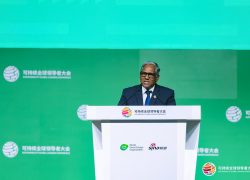A major step forward in enhancing digital payment accessibility and improving the ease of doing business across borders has been announced by the Maldives Monetary Authority (MMA). The central bank has revealed plans to establish an independent entity, Payment Maldives which will lead the modernization of the country’s national payment infrastructure. This reform is expected to play a pivotal role in expanding the use of secure, cost-effective, and streamlined financial services throughout the Maldives, while enhancing economic resilience and positioning the country as a digitally integrated destination for tourists and international investors alike.
At the heart of this initiative is the implementation and expansion of the Maldives National Instant Payment System, Favara, which aims to facilitate rapid and seamless transactions for individuals and businesses. The MMA has signed a bilateral agreement with NPCI International Payments Limited (NIPL) of India to integrate Favara with India’s widely used Unified Payments Interface (UPI), a collaboration that will improve the interoperability of payment systems between the two countries. This integration will significantly ease cross-border financial exchanges, particularly benefiting Indian tourists, Maldives’ largest inbound travel market and Maldivian businesses engaged in imports and service transactions with India.
The UPI-Favara integration will be implemented in two strategic phases. The first phase, scheduled for 2026, will enable real-time peer-to-peer (P2P) money transfers between users in the Maldives and India, using domestic currencies. This means Indian tourists will be able to send payments instantly to Maldivian merchants using UPI apps without currency exchange bottlenecks. The second phase will introduce QR code payment capabilities, further simplifying business transactions and enabling a contactless, mobile-first payment experience. These services will be especially impactful in the tourism and retail sectors, where speed and convenience of payments play a crucial role in visitor satisfaction.
In preparation for these enhancements, MMA is also developing a National QR Code Standard. This standardisation effort will ensure compatibility across all banks and payment service providers operating in the country. It will unify currently fragmented QR code formats into a single framework, enabling widespread acceptance of QR-based payments in resorts, guesthouses, shops, restaurants, and other service providers frequented by tourists.
The creation of Payment Maldives, the new national payment operator, reflects MMA’s commitment to adopting globally proven models to manage and govern digital payment ecosystems. MMA notes that several other countries have benefited from similar institutional setups, which provide agility in deploying advanced technological solutions. The new company will coordinate system upgrades, promote innovation, and ensure that payment platforms are compliant with international standards and best practices.
In support of this financial transformation, the Maldives government is also working with MMA to revise existing legal and regulatory frameworks. These legislative updates are essential for enabling a more robust and future-ready financial sector. Legal reforms will support cross-border digital payment operations, data security, licensing, and consumer protection protocols, all integral to building a safe and efficient digital finance environment.
According to MMA, this initiative aligns closely with broader fiscal and economic development objectives. By reducing dependence on cash-based transactions, the country can lower operational costs, curb financial leakages, and improve transparency across sectors. Furthermore, the enhanced digital ecosystem will facilitate financial inclusion for remote islands and underbanked communities, creating new opportunities for local entrepreneurs and small businesses.
As the Maldives continues to position itself as a premium destination for tourism, trade, and investment, these reforms demonstrate a strong commitment to fostering a digitally empowered and inclusive economy. With over 1.8 million tourist arrivals recorded in 2023, and India consistently ranking as the top source market, the integration of UPI will offer an added layer of convenience to travellers, making the Maldives an even more attractive destination.
The modernisation of the country’s payment system through Favara, UPI integration, QR code standardisation, and the establishment of Payment Maldives represents a forward-thinking approach to economic and financial policy. These reforms are expected to boost business confidence, improve service delivery in tourism, retail, and public sectors, and contribute to the Maldives’ long-term economic stability and global financial connectivity.



 advertisment
advertisment




 advertisment
advertisment





